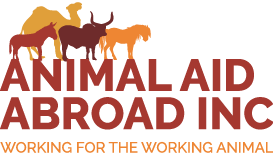Donkey laid to rest after being hit by a car
This follow-up report from Social and Animal Welfare Service - SAWS provides a follow-up for the recent report of a donkey wounded when it was hit by a car:
SAWS’ policy is to follow up every donkey assisted. Initially, when the donkey was wounded, it was unable to walk. Therefore, SAWS arranged to transport the donkey by renting a larger truck which had enough space for the transportation of the donkey. After SAWS’ vet doctor provided the first assessment and the medical treatment, he advised the donkey owner to refrain from using the donkey in any way, shape, or form. The next day, SAWS Executive Director, the vet doctor, and the Ministry of Livestock (MoL) visited the donkey and conducted an additional critical and thorough assessment. The assessment revealed that the donkey was not making any progress due to external and internal damages. In addition to the visible external wounds, the donkey’s vital internal organs were damaged and it suffered from internal bleeding. The donkey was unable to respond to the treatment and was also unable to eat, drink, sleep, or move. The team did everything at its disposal to rescue the donkey.
However, when all options had been exhausted, the team convened a crucial meeting to discuss the best option available. After exhaustively painful and educated discussion about the painful state of the donkey, SAWS’ vet doctor and the DG of MoL in Hargeisa Region Mr Ahmed Ali (Hule) came up with two options: 1) either to permit the donkey to endure the untreatable painful existence or 2) to mercifully put the donkey to sleep. The former option seemed inhumane whereas the latter option seemed the best option. With the presence of MoL the vet doctor, thus, administered mercy killing medications. To put the donkey to sleep was very painful, disappointing, and unfortunate decision.
SAWS, the vet doctor, and the representatives of the Ministry of Livestock were disappointed. Due to the disappointing outcome, SAWS decided to not to take pictures in order to respect the donkey.
Regarding the accident report involving the owner of the car, the court ordered the owner of the car recompense the donkey owner as soon as possible without delay; that is, to pay an amount of money equal to the price of the donkey in question. The owner of the car requested to pay the compensation within ten days. However, since the donkey owner is poor and has a large family who financially depend solely on the donkey, the donkey owner does not have any other source of income. Therefore, SAWS has decided to provide some financial support for the donkey owner for those ten days.
The court order did not include any citation. The reason that the judge did not include any citation is this: The city of Hargeisa’s traffic laws are almost nonexistent and the few traffic laws that exist, are not enforced. The absence of effective traffic laws is one of the major reasons for these accidents. And the majority of accidents involving working donkeys stem from these nonexistent and ineffective traffic laws combined with the absence of a Donkey Welfare Act in the city.
As we have reported previously, SAWS has succeeded to enact a Donkey Welfare Act in Burao city aimed at protecting working donkeys. The said Act, however, is absent in Hargeisa city. Therefore, in order to protect the rights of the working donkeys, including punishments and/or citations of hitting a donkey, SAWS desires to enact a Donkey Welfare Act in Hargeisa city with the aim to reduce accidents involving working donkeys as well as non-working donkeys. The said Act will make drivers think twice before hitting any donkey. However, SAWS is currently unable to advocate and enact the Donkey Welfare Act in Hargeisa city due to lack of funds.
If you'd like to help support AAA partner group SAWS in their goal to avoid heartbreaking situations such as this, please visit www.animalaidabroad.org/donate to learn more.
